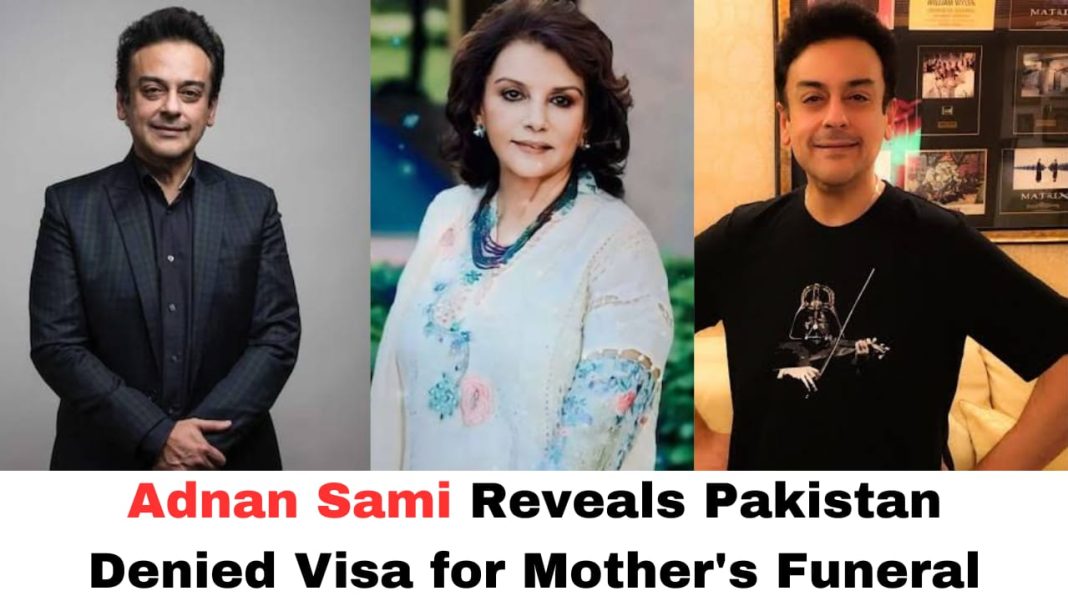Digital News Guru Lifestyle Desk:
Adnan Sami’s Emotional Revelation: Denied a Final Goodbye to His Mother
Renowned singer-composer Adnan Sami has recently shared a deeply personal and painful experience that underscores the profound impact of political decisions on individual lives. In a candid interview, Sami revealed that he was denied a visa by Pakistan to attend his mother, Begum Naureen’s, funeral in October 2024. This refusal forced him to witness her last rites remotely via a WhatsApp video call, highlighting the emotional toll of strained diplomatic relations.
A Son’s Unfulfilled Farewell
Sami recounted the harrowing experience, stating, “I applied for a visa and told them my mother had passed away. Still, they refused. I couldn’t go.

I watched the entire janaza through a WhatsApp video call” . Despite his urgent appeals and the Indian government’s immediate approval for his travel, the Pakistani authorities declined his visa request, leaving him unable to bid a final farewell to his mother in person.
The Journey from Pakistan to India
Born in London to a Pakistani father and an Indian mother, Sami’s early life was marked by a rich cultural heritage. His father, Arshad Sami Khan, served as a pilot in the Pakistan Air Force and later as a diplomat, while his mother hailed from Jammu, India . Despite his Pakistani roots, Sami faced numerous challenges in his homeland, including professional obstacles and personal hardships.
In 2016, seeking artistic freedom and a more supportive environment, Sami renounced his Pakistani citizenship and became an Indian citizen. He emphasized that his decision was not financially motivated, stating, “I was born into a wealthy family. I never needed to do anything for money. I left behind property worth crores in Pakistan and started from scratch in India” .
The Emotional Toll of Political Decisions
The denial of a visa to attend his mother’s funeral has reignited discussions about the human cost of political tensions. Sami’s experience underscores how diplomatic strains can intrude upon deeply personal moments, depriving individuals of the opportunity to grieve and find closure.
In his interview, Sami expressed gratitude towards the Indian authorities for their compassion and support during his time of need. “I asked the Indian government if I could go, and they said, ‘Of course. Your mother has passed away, you must go.’ There was absolutely no objection from their side” .
Public Reaction and Broader Implications
Sami’s revelation has elicited a wave of empathy and support from fans and the general public. Many have expressed outrage over the Pakistani government’s decision, viewing it as an unnecessary politicization of a personal tragedy.

The incident has sparked broader conversations about the need for humanitarian considerations to take precedence over political disputes, especially in matters involving personal loss and family.
A Call for Compassion Beyond Borders
Adnan Sami’s ordeal serves as a poignant reminder of the profound impact that political decisions can have on individual lives. It highlights the importance of empathy and humanity in governance, especially when dealing with personal tragedies that transcend national boundaries.
As diplomatic relations continue to evolve, Sami’s experience calls for a reevaluation of policies that hinder individuals from fulfilling their familial duties and grieving processes. It underscores the necessity for governments to prioritize compassion and understanding, ensuring that political differences do not obstruct the fundamental human experiences of love, loss, and remembrance.
At a Glance
Singer-composer Adnan Sami has shared a deeply personal and emotional experience regarding the passing of his mother, Begum Naureen, in October 2024. Despite his efforts, Pakistan denied him a visa to attend her funeral, compelling him to witness the last rites through a WhatsApp video call.
In a recent interview, Sami recounted that upon his mother’s sudden demise, he sought permission from both Indian and Pakistani authorities to travel for her funeral. While the Indian government promptly granted him clearance, the Pakistani authorities refused his visa application, even after he explained the circumstances. He expressed his anguish, stating, “I applied for a visa and told them my mother had passed away. Still, they refused. I couldn’t go. I watched the entire janaza through a WhatsApp video call.”

Sami, who became an Indian citizen in 2016 after relinquishing his Pakistani citizenship, has previously spoken about the challenges he faced in Pakistan, including professional obstacles and emotional distress. He emphasized that his decision to move to India was not financially motivated, noting that he left behind property worth crores in Pakistan in search of artistic freedom and respect.
This incident underscores the personal toll that political tensions can exert on individuals, especially when familial bonds are involved. Sami’s experience has resonated with many, highlighting the complexities faced by those navigating cross-border relationships amidst strained diplomatic ties.
You May Also Read: Dhoom 4: Ranbir Kapoor in Lead, Ayan Mukerji is likely to direct, Filming Begins April 2026








